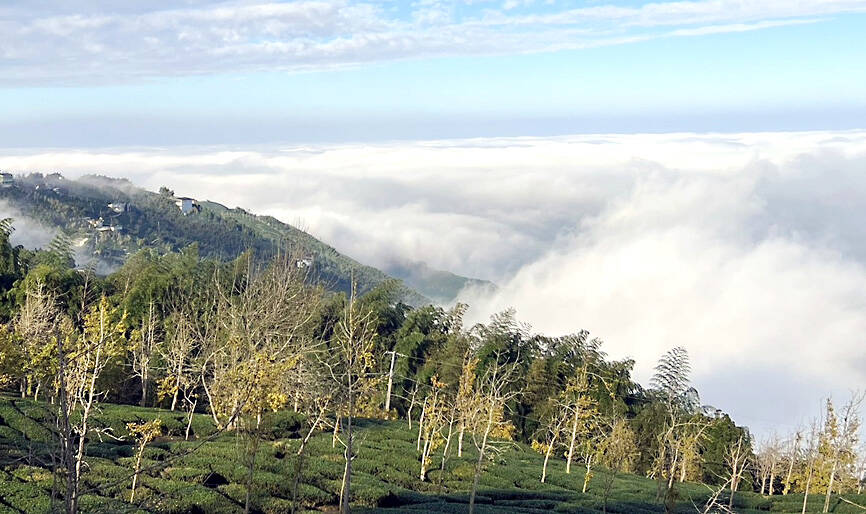A strong continental cold air mass moving south toward Taiwan could push temperatures in Taipei down to 10°C or below sometime from yesterday night to Saturday, the Central Weather Administration (CWA) said yesterday.
As the cold front approaches, temperatures yesterday were expected to drop to a low of about 14°C in northern Taiwan and Yilan County, and 16°C to 19°C in other parts of the nation, the CWA said.
The CWA issued cold weather advisories for New Taipei City, Keelung, Taipei and Taoyuan, and Hsinchu and Yilan counties, warning of the possibility of overnight temperatures of 10°C or below in those areas.

Photo: Hsieh Chieh-yu, Taipei Times
The weather agency forecast intermittent rainfall in northern and eastern Taiwan, at Hengchun Peninsula in the south, and in offshore Lienchiang County.
Sudden heavy rain is possible in the north in the Keelung area, in Yilan County, and in Taipei and New Taipei City, it said.
As the moist air moves south, central and southern Taiwan could report scattered drizzle, it said.
The cold front’s strength would be strongest from Thursday to Saturday, independent meteorologist Wu Der-rong (吳德榮) said.
During the period, the front is expected to affect all parts of Taiwan, with temperatures dropping to 7°C or below in some coastal and low-lying areas, he said.
There is a chance of snow on some of Taiwan’s highest mountains, including Lalashan (拉拉山), Taipingshan (太平山) and Hehuanshan (合歡山), but it would depend on the moisture in the air and temperatures, Wu said.
Temperatures could drop below 0°C on Datunshan (大屯山) in Taipei, with soft hail and rime ice possible, he said.
The cold front would gradually weaken from Saturday morning to Sunday morning, although the north would still have wet, cold weather, Wu said.
The lowest temperature recorded at lower elevations in Taiwan yesterday was 13°C in Taoyuan and New Taipei City at about 7am, CWA data showed.
The lowest temperature on Taiwan’s outlying islands was 8.9°C at 3:53am on the island of Nangan (南竿) in Lienchiang County.

Actor Darren Wang (王大陸) was questioned by prosecutors for allegedly orchestrating an attack on a taxi driver after he was allegedly driven on a longer than necessary route in a car he disliked. The questioning at the New Taipei City District Prosecutors’ Office was ongoing as of press time last night. Police have recommended charges of attempted murder. The legally embattled actor — known for his role in the coming-of-age film Our Times (我的少女時代) — is under a separate investigation for allegedly using fake medical documents to evade mandatory military service. According to local media reports, police said Wang earlier last year ordered a

CAUTION: Based on intelligence from the nation’s security agencies, MOFA has cautioned Taiwanese travelers about heightened safety risks in China-friendly countries The Ministry of Foreign Affairs (MOFA) yesterday urged Taiwanese to be aware of their safety when traveling abroad, especially in countries that are friendly to China. China in June last year issued 22 guidelines that allow its courts to try in absentia and sentence to death so-called “diehard” Taiwanese independence activists, even though Chinese courts have no jurisdiction in Taiwan. Late last month, a senior Chinese official gave closed-door instructions to state security units to implement the guidelines in countries friendly to China, a government memo and a senior Taiwan security official said, based on information gathered by Taiwan’s intelligence agency. The

Taiwan Semiconductor Manufacturing Co (TSMC), the world’s largest contract chipmaker, said yesterday that it is looking to hire 8,000 people this year, at a time when the tech giant is expanding production capacity to maintain its lead over competitors. To attract talent, TSMC would launch a large-scale recruitment campaign on campuses across Taiwan, where a newly recruited engineer with a master’s degree could expect to receive an average salary of NT$2.2 million (US$60,912), which is much higher than the 2023 national average of NT$709,000 for those in the same category, according to government statistics. TSMC, which accounted for more than 60 percent

President William Lai (賴清德) should protect Taiwan Semiconductor Manufacturing Co (TSMC), and stop supporting domestic strife and discord, former president Ma Ying-jeou (馬英九) wrote on Facebook yesterday. US President Donald Trump and TSMC on Monday jointly announced that the company would invest an additional US$100 billion over the next few years to expand its semiconductor manufacturing operations in the US. The TSMC plans have promoted concern in Taiwan that it would effectively lead to the chipmaking giant becoming Americanized. The Lai administration lacks tangible policies to address concerns that Taiwan might follow in Ukraine’s footsteps, Ma wrote. Instead, it seems to think it could